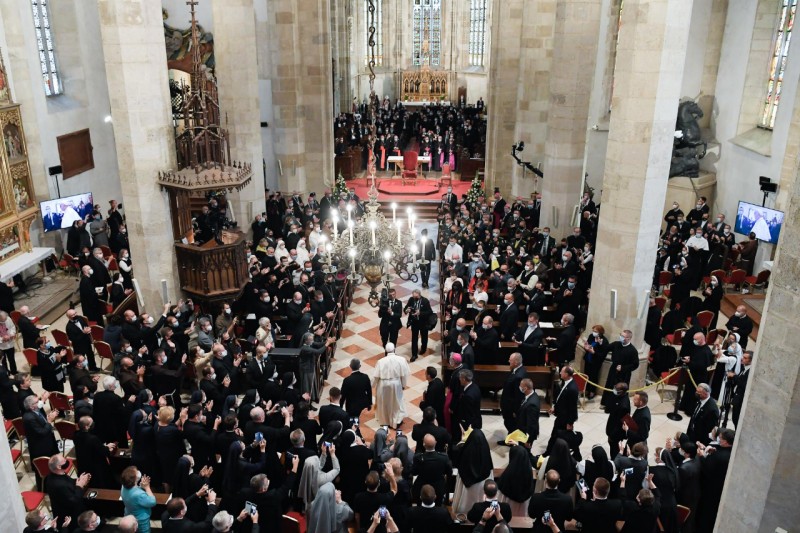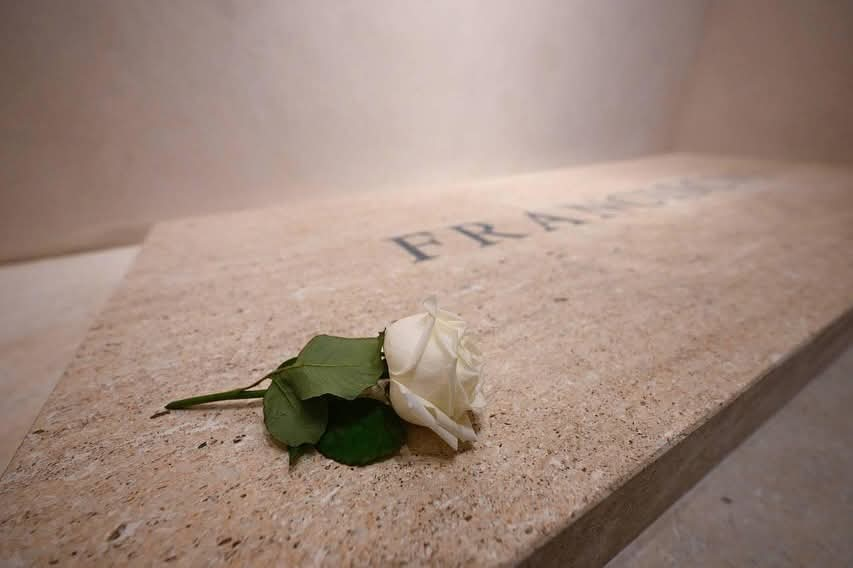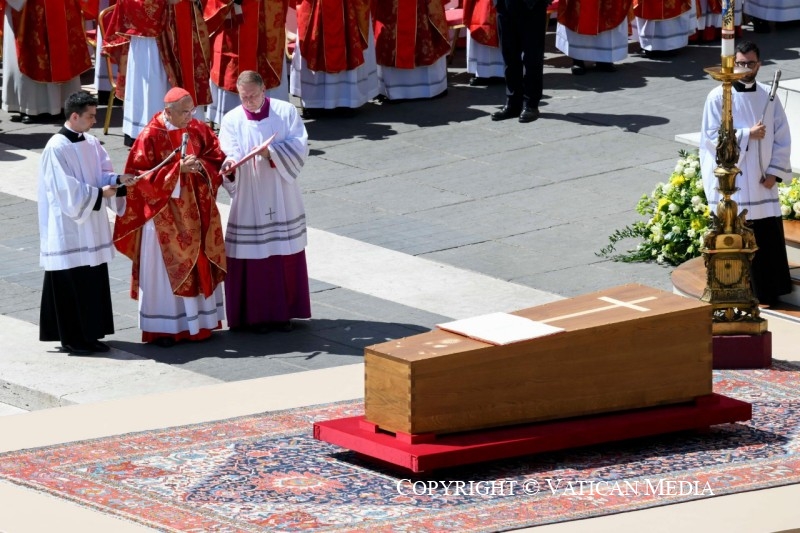Pope Urges Church to Live ‘Within the World’
Address to Priests, Religious, Seminarians, Consecrated Persons, and Catechists in Cathedral of Saint Martin in Bratislava

“How great is the beauty of a humble Church, a Church that does not stand aloof from the world, viewing life with a detached gaze, but lives her life within the world.”
That was the key message of Pope Francis to priests, religious, seminarians, consecrated persons, and catechists on September 13, 2021, when he addressed them in the Cathedral of Saint Martin in Bratislava, Slovakia, an important stop during his September 12-15 apostolic journey.
“Living within the world means being willing to share and to understand people’s problems, hopes, and expectations,” the Holy Father continued. “This will help us to escape from our self-absorption, for the center of the Church is not the Church!”
The Pope pointed to three concepts necessary for the Church to be “within” the society and understand the needs and expectations of the people: freedom, creativity, and dialogue.
Freedom: “Without freedom, there can be no true humanity, for human beings were created free in order to be free. The tragic chapters of your country’s history provide a great lesson: whenever freedom was attacked, violated, and suppressed, humanity was disfigured and the tempests of violence, coercion, and the elimination of rights rapidly followed.”
Creativity: “You have inherited a great tradition. Your religious heritage was born of the preaching and ministry of the outstanding figures of Saints Cyril and Methodius. They teach us that evangelization is never mere repetition of the past. The joy of the Gospel is always Christ, but the routes that this good news travels through time and history can be different. Together, Cyril and Methodius traversed this part of the European continent and, burning with passion for the preaching of the Gospel, they even invented a new alphabet for the translation of the Bible, the liturgy, and Christian doctrine.”
Dialogue: “A Church that trains people in interior freedom and responsibility, one able to be creative by plunging into their history and culture, is also a Church capable of engaging in dialogue with the world, with those who confess Christ without being ‘ours’, with those who are struggling with religion, and even with those who are not believers.
The Holy Father concluded with the admission that achieving unity and dialogue can be difficult. Past conflict leaves deep scars.
“Wounds, however, can always turn into passages, openings that, in imitating the wounds of the Lord, allow God’s mercy to emerge,” Francis said. “That grace changes our lives and makes us artisans of peace and reconciliation.
“You have a beautiful proverb: If someone throws a stone at you, give him bread in return”.
Following is the Holy Father’s full address, provided by the Vatican:
Dear Brother Bishops,
Dear Priests, Religious, and Seminarians
Dear Catechists, Brothers, and Sisters, good morning!
I am happy to greet all of you, and I am grateful to Archbishop Stanislav Zvolenský for his kind words. Thank you for your invitation to feel at home in your midst. I have come as your brother, so indeed I feel like one of you. I am here to listen to your experiences, your questions, and the aspirations and hopes of this Church and this country. So it was with the first Christian community: they were constant in prayer and they walked together in concord (cf. Acts 1: 2-14).
This is what we need most of all: a Church that can walk together, that can tread the paths of life holding high the living flame of the Gospel. The Church is not a fortress, a stronghold, a lofty castle, self-sufficient and looking out upon the world below. Here in Bratislava, you have a castle and it is a fine one! The Church, though, is a community that seeks to draw people to Christ with the joy of the Gospel. She is the leaven of God’s Kingdom of love and peace in our world. Please, let us not be tempted by worldly trappings and grandeur! The Church must be humble, like Jesus, who stripped himself of everything and made himself poor in order to make us rich (cf. 2 Cor 8:9). That is how he came to dwell among us and to care for our wounded humanity.

How great is the beauty of a humble Church, a Church that does not stand aloof from the world, viewing life with a detached gaze, but lives her life within the world. Living within the world means being willing to share and to understand people’s problems, hopes, and expectations. This will help us to escape from our self-absorption, for the center of the Church is not the Church! We have to leave behind undue concern for ourselves, for our structures, for what society thinks about us. Instead, we need to become immersed in the real lives of people and ask ourselves: what are their spiritual needs and expectations? What do they expect from the Church? It is important to try to respond to these questions. For me, three words come to mind.
The first is freedom. Without freedom, there can be no true humanity, for human beings were created free in order to be free. The tragic chapters of your country’s history provide a great lesson: whenever freedom was attacked, violated, and suppressed, humanity was disfigured and the tempests of violence, coercion, and the elimination of rights rapidly followed.
Freedom is not something achieved automatically, once and for all. It is always a process, at times wearying and ever in need of being renewed. It is not enough to be free outwardly, or in the structures of society, to be authentically free. Freedom demands personal responsibility for our choices, discernment, and perseverance. This is indeed wearisome and even frightening. At times, it is easier not to be challenged by concrete situations, to continue doing what we did in the past, without getting too deeply involved, without taking the risk of making a decision. We would rather get along by doing what others – or public opinion – decide for us. Let us reflect, though, on the history of the people of Israel: they suffered under the tyranny of the Pharaoh, they were slaves and then the Lord set them free. Yet to experience true freedom, not simply freedom from their enemies, they had to cross the desert, to undertake an exhausting journey. Then they began to think: “Weren’t we better off before? At least we had a few onions…” This is the great temptation: better a few onions than the effort and the risk involved in freedom.
Sometimes in the Church, too, this idea can take hold. Better to have everything readily defined, laws to be obeyed, security, and uniformity, rather than to be responsible Christians and adults who think, consult their conscience and allow themselves to be challenged. In the spiritual life and in the life of the Church, we can be tempted to seek an ersatz peace that consoles us, rather than the fire of the Gospel that disturbs and transforms us. The safe onions of Egypt prove more comfortable than the uncertainties of the desert. Yet a Church that has no room for the adventure of freedom, even in the spiritual life, risks becoming rigid and self-enclosed. Some people may be used to this. But many others – especially the younger generations – are not attracted by a faith that leaves them no interior freedom, by a Church in which all are supposed to think alike and blindly obey.
Dear friends, do not be afraid to train people for a mature and free relationship with God. This approach may give the impression that we are diminishing our control, power, and authority, yet the Church of Christ does not seek to dominate consciences and occupy spaces, but rather to be a “wellspring” of hope in people’s lives. I say this above all to bishops and priests, for you are ministering in a country where much has changed quickly and many democratic processes have been launched, but freedom remains fragile. This is especially true where people’s hearts and minds are concerned. For this reason, I encourage you to help set them free from a rigid religiosity. No one should feel overwhelmed. Everyone should discover the freedom of the Gospel by gradually entering into a relationship with God, confident that they can bring their history and personal hurts into his presence without fear or pretense, without feeling the need to protect their own image. May the proclamation of the Gospel be liberating, never oppressive. And may the Church be a sign of freedom and welcome!
A second word: creativity. You have inherited a great tradition. Your religious heritage was born of the preaching and ministry of the outstanding figures of Saints Cyril and Methodius. They teach us that evangelization is never mere repetition of the past. The joy of the Gospel is always Christ, but the routes that this good news travels through time and history can be different. Together, Cyril and Methodius traversed this part of the European continent and, burning with passion for the preaching of the Gospel, they even invented a new alphabet for the translation of the Bible, the liturgy, and Christian doctrine. They thus became the apostles of the faith’s inculturation in your midst. They invented new languages for handing on the Gospel; they were creative in translating the Christian message, and they drew so close to the history of the peoples they encountered that they learned their language and assimilated their culture. Isn’t this what Slovakia also needs today? Isn’t this perhaps the most urgent task facing the Church before the peoples of Europe: finding new “alphabets” to proclaim the faith? We are heirs to a rich Christian tradition, yet for many people today, that tradition is a relic from the past; it no longer speaks to them or affects the way they live their lives. Faced with the loss of the sense of God and of the joy of faith, it is useless to complain, to hide behind a defensive Catholicism, to judge and blame the world. We need the creativity of the Gospel. Let us think of those people who brought a paralytic to Jesus, but could not get through the front door. They made an opening in the roof and lowered him down from above (cf. Mk 2:1-5). They were creative! What a fine thing it is when we find new ways, means, and languages to proclaim the Gospel! If by our preaching and pastoral care we can no longer enter by the usual way, let us try to open up different spaces, and experiment with other means. Cyril and Methodius did exactly this, and they teach us that the Gospel cannot grow unless it is rooted in the culture of a people, its symbols and questions, its words, and its very life. As you know, the two brothers met with obstacles and persecution. They were accused of heresy because they had dared to translate the language of the faith. Such is the ideology born of the temptation of uniformity. Evangelization, on the other hand, is a process, a process of inculturation. It is a fruitful seed of newness, the newness of the Spirit who renews all things.
Finally, a third word: dialogue. A Church that trains people in interior freedom and responsibility, one able to be creative by plunging into their history and culture, is also a Church capable of engaging in dialogue with the world, with those who confess Christ without being “ours”, with those who are struggling with religion, and even with those who are not believers. It is a Church that, in the footsteps of Cyril and Methodius, unites and holds together East and West, different traditions and sensibilities. A community that, in proclaiming the Gospel of love, makes it possible for communion, friendship, and dialogue to flourish between believers, between the different Christian confessions, and between peoples.
Unity, communion, and dialogue are always fragile, especially against the backdrop of a painful history that has left its scars. The memory of past injuries can breed resentment, mistrust, and even contempt; it can tempt us to barricade ourselves against those who are different. Wounds, however, can always turn into passages, openings that, in imitating the wounds of the Lord, allow God’s mercy to emerge. That grace changes our lives and makes us artisans of peace and reconciliation. You have a beautiful proverb: “If someone throws a stone at you, give him bread in return”. How truly evangelical this is! It is Jesus’ own invitation to break the vicious and destructive cycle of violence by turning the other cheek to those who persecute us, by overcoming evil with good (cf. Rom 12:21). I am always struck by an incident in the history of Cardinal Korec. He was a Jesuit Cardinal, persecuted by the regime, imprisoned, and sentenced to forced labor until he fell ill. When he came to Rome for the Jubilee of the Year 2000, he went to the catacombs and lit a candle for his persecutors, imploring mercy for them. This is the Gospel! It grows in life and in history through humble and patient love.
Dear friends, I thank God for these moments together, and I thank you most heartily for all you do, and for all you are. I encourage you to persevere in your journey in the freedom of the Gospel, in the creativity of faith, and in the dialogue that has its source in the mercy of God, who has made us brothers and sisters and calls us to be builders of harmony and peace. I impart to you my cordial blessing and I ask you, please, to pray for me. Thank you!
[01192-EN.01] [Original text: Italian]
© Libreria Editrice Vatican
Related

Cardinal Parolin at the Novendalia Mass: “Mercy leads us to the heart of faith”
Exaudi Staff
27 April, 2025
8 min

Pope Francis’ Tomb in Santa Maria Maggiore
Exaudi Staff
27 April, 2025
1 min

Mercy and the joy of the Gospel are two key concepts of Pope Francis
Exaudi Staff
26 April, 2025
9 min

Thousands of faithful bid farewell to Pope Francis in St. Peter’s Square
Exaudi Staff
26 April, 2025
2 min
 (EN)
(EN)
 (ES)
(ES)
 (IT)
(IT)

